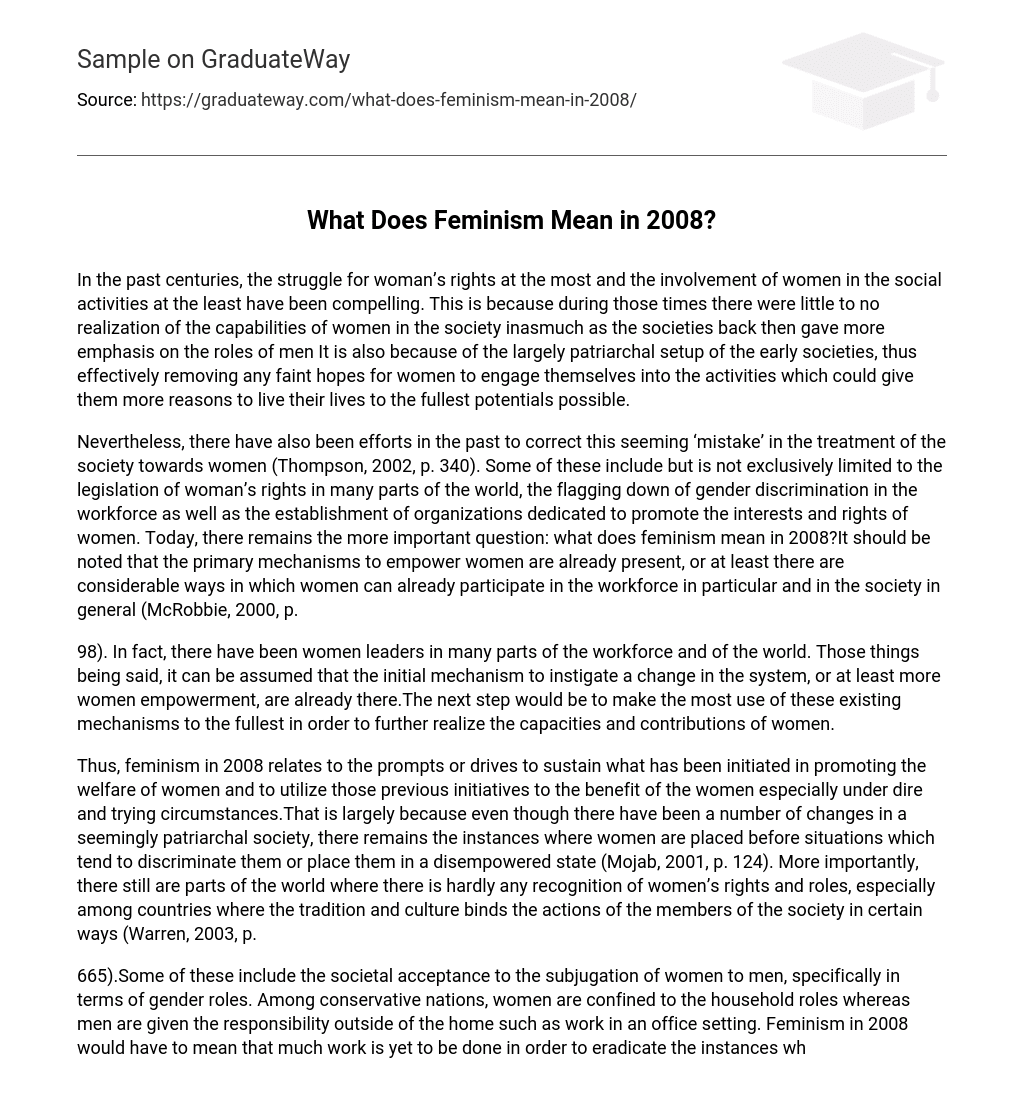In the past centuries, the struggle for woman’s rights at the most and the involvement of women in the social activities at the least have been compelling. This is because during those times there were little to no realization of the capabilities of women in the society inasmuch as the societies back then gave more emphasis on the roles of men It is also because of the largely patriarchal setup of the early societies, thus effectively removing any faint hopes for women to engage themselves into the activities which could give them more reasons to live their lives to the fullest potentials possible.
Nevertheless, there have also been efforts in the past to correct this seeming ‘mistake’ in the treatment of the society towards women (Thompson, 2002, p. 340). Some of these include but is not exclusively limited to the legislation of woman’s rights in many parts of the world, the flagging down of gender discrimination in the workforce as well as the establishment of organizations dedicated to promote the interests and rights of women. Today, there remains the more important question: what does feminism mean in 2008?It should be noted that the primary mechanisms to empower women are already present, or at least there are considerable ways in which women can already participate in the workforce in particular and in the society in general (McRobbie, 2000, p.
98). In fact, there have been women leaders in many parts of the workforce and of the world. Those things being said, it can be assumed that the initial mechanism to instigate a change in the system, or at least more women empowerment, are already there.The next step would be to make the most use of these existing mechanisms to the fullest in order to further realize the capacities and contributions of women.
Thus, feminism in 2008 relates to the prompts or drives to sustain what has been initiated in promoting the welfare of women and to utilize those previous initiatives to the benefit of the women especially under dire and trying circumstances.That is largely because even though there have been a number of changes in a seemingly patriarchal society, there remains the instances where women are placed before situations which tend to discriminate them or place them in a disempowered state (Mojab, 2001, p. 124). More importantly, there still are parts of the world where there is hardly any recognition of women’s rights and roles, especially among countries where the tradition and culture binds the actions of the members of the society in certain ways (Warren, 2003, p.
665).Some of these include the societal acceptance to the subjugation of women to men, specifically in terms of gender roles. Among conservative nations, women are confined to the household roles whereas men are given the responsibility outside of the home such as work in an office setting. Feminism in 2008 would have to mean that much work is yet to be done in order to eradicate the instances where women want to contribute to the household by working, too, in an office setting or the types of works which women can also participate.
Feminism in 2008 would have to mean that the current state of women should be acknowledged, which is the state where the various sectors of the society, though helping in a certain way to address gender discrimination and discrepancies, are still unable to fully implement an equal level of ‘playing field’ where both men and women can participate on equal footing. As Thompson and Walker (1995) put it, “feminism is changing” and “we are in the midst of a transformation” (p. 47). These changes, for the most part, have led towards what we may call as the second wave feminism where feminism “moved women’s reproductive and workplace roles into the public policy debate (Hayes, McAllister & Studlar, 2000, p.
425). Today in 2008, the public policy debates continue while there are still areas in the world afflicted by the discrimination towards women.Feminism in 2008, then, espouses the ideology that the force rallying behind the calls for the concrete realization of the intentions within the second wave feminism has not yet withered. That is, the goals have not yet been fully realized even in the face of the society where woman are already given the opportunities to participate.
That is so because there are areas somewhere in the world where the rights of women are still neglected.In strictly Muslim countries, woman are hardly observed taking part in the more important sectors of public policy making which is doubled in no small way by the strong preference to males (Mojab, 2001, p. 124). In the most rural areas of underdeveloped, third world countries, women are seen to remain within the ‘fences’ of the house whereas men have more opportunities waiting for them outside of it (McRobbie, 2000, p.
99). It is therefore no surprise that feminism in 2008 means more struggles to attain the ideals of feminism.Feminism 2008 remains the continuation of the struggles in the past or in the earlier decades although it can also be said that much developments have already been established. These developments have also contributed to the uplifting of the welfare of women in many ways.
The task to continue with the ideals of the second wave feminism remains inasmuch as the forces that discriminate based on gender are still present and are still gaining ground not only in the workforce but also in the average household among families.





